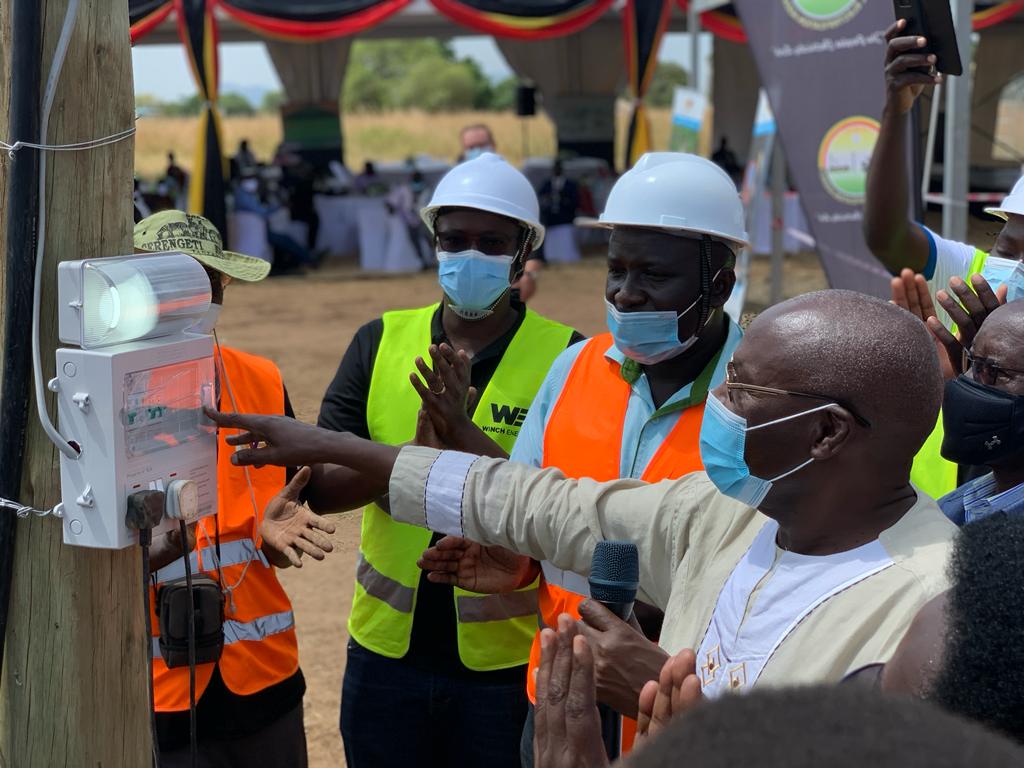The role solar can play in helping to achieve food security has been highlighted by the commissioning of 25 mini-grids in Northern Uganda, with backing from Germany's state development agency and the EU.
The two donors, and the Ugandan government, have commissioned London-based off-grid developer Winch Energy to install the mini-grids as part of the European Union and UN-backed Development Initiative for Northern Uganda (DINU), which aims to bridge the development gap between the north and the rest of the African nation.
Development agency the Deutsche Gesellschaft für Internationale Zusammenarbeit, and the EU, will fund the mini-grid program with non-repayable grants to the extent of UGX18 billion (€4.44 million) with the local networks to be established in 25 villages in the Lamwo district of Uganda.
AgriPV
Solar could disrupt the fossil fuel industry and help with two of the biggest sustainability challenges of our times: biodiversity loss and food production. pv magazine’s UP initiative this year shone a spotlight on agrivoltaics. Read our coverage here.
Winch, which is owned by French renewables business Total Eren; Japanese conglomerate Itochu Corp; Saudi electrical manufacturer Al Gihaz Holding; and U.K. financial services firm Winch Partners Ltd, said funding for the solar networks included a significant sum which would enable it to reduce the price paid by electricity users for their energy.
The company's country director for Uganda, Alex Wanume, said the total project cost is $4 million and 60% of the sum will be used to subsidize the cost of the electricity generated so the 15,000 people and 100 businesses which will benefit will pay only $0.29/kWh. “This is the lowest tariff for mini-grids in Africa or anywhere else in the world,” he said. “People can now get affordable power for business and even for home use. A lower tariff is what we are looking at, at the end of the day; lower tariffs and good quality services.”
Capacity
The total generation capacity to be installed by Winch will be around 1 MW, said Wanume.
In addition to benefiting individual homes and businesses, the mini-grids will also supply solar-powered street lighting and improved water services through pumping and purification.
The €25.9 million DINU program, set up in December 2017 with €25.5 million from the EU and the balance from the UN's Capital Development Fund, is set to run until June and aims to bridge the gap between the region and the rest of Uganda by addressing nutrition and food security, roads, and good governance.
Popular content
The solar mini-grids are set to boost agricultural productivity, according to Lamwo-district local authority representative Dennis Onyong. He said: “Agriculture is a major source of livelihood. Despite farmers producing a lot, at the moment, they are earning little because the value is not added to the products going to the market. This should now change with access to electricity.”
Fellow local official Bernard Charles Eliyanno said: “The power from the mini-grids is a positive move to help our farmers take it to another level of value addition. I believe that we will be food secure, have an increase in the volume of incomes, and shall be able to create more employment opportunities.”
Emissions
Matthias Schauer, the German ambassador to Uganda, said energy emissions are expected to be the principal source of future greenhouse gas emission growth in Uganda and mini-grids will play an important role in mitigating that rise, as well diversifying the nation's renewable energy portfolio away from a dependence of hydropower, which can be affected by climate change; and offering better energy efficiency than traditional agricultural use of biomass.
Uganda's energy minister, Okaasai Sidronius Opolot, said the government is aiming for universal access to electricity by 2040.
“We are, therefore, not setting up mini-grids only in Lamwo,” he said. “We have tendered out 40 mini-grids to be developed and operated by the private sector and [it is] estimated [they will] provide 4,000 connections. Of the 40 mini-grids, 25 have been set up in Lamwo, and 15 will be set up in Isingiro and Rakai districts.
“The National Development Plan III aims to have 1,500 mini-grids installed in the next five years, and the current National Electrification Strategy plans about 2,700 mini-grids to be installed by 2030. The implementation of these mini-grids will follow a private-sector approach with the participation of the government.”
This copy was amended on 09/12/21 after the Deutsche Gesellschaft für Internationale Zusammenarbeit confirmed the project finance is being provided on a non-repayable, grant basis.
This content is protected by copyright and may not be reused. If you want to cooperate with us and would like to reuse some of our content, please contact: editors@pv-magazine.com.


By submitting this form you agree to pv magazine using your data for the purposes of publishing your comment.
Your personal data will only be disclosed or otherwise transmitted to third parties for the purposes of spam filtering or if this is necessary for technical maintenance of the website. Any other transfer to third parties will not take place unless this is justified on the basis of applicable data protection regulations or if pv magazine is legally obliged to do so.
You may revoke this consent at any time with effect for the future, in which case your personal data will be deleted immediately. Otherwise, your data will be deleted if pv magazine has processed your request or the purpose of data storage is fulfilled.
Further information on data privacy can be found in our Data Protection Policy.